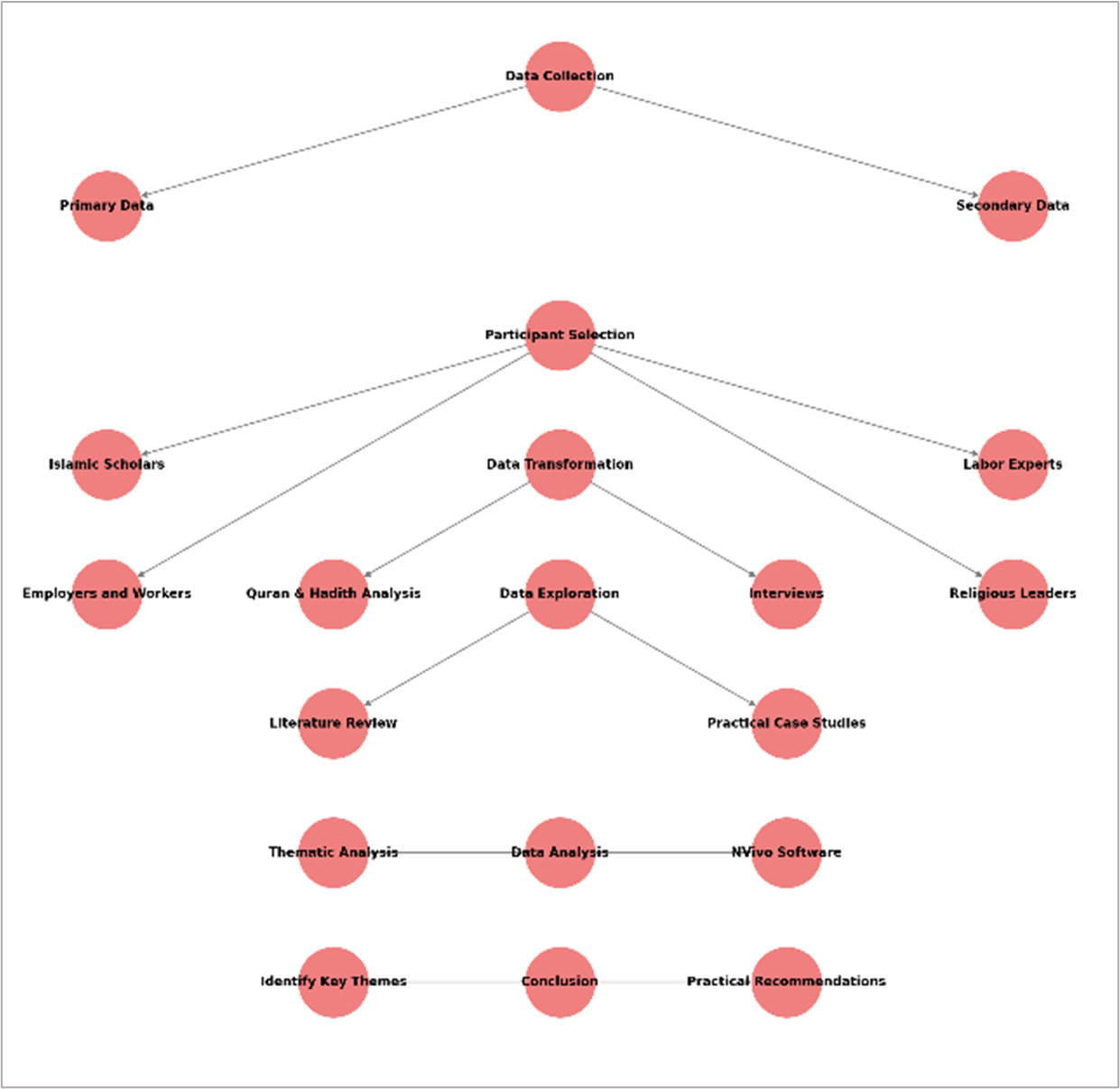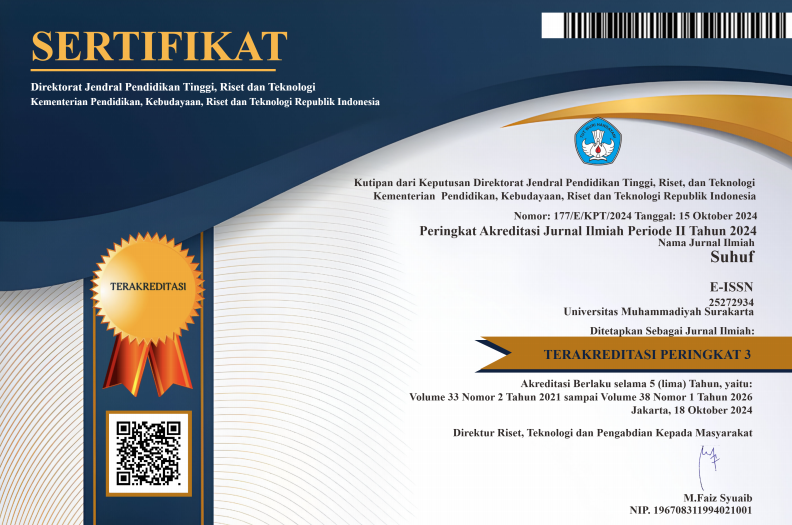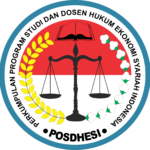The Dignity of Labor in Islam: Ethical Principles and Contemporary Relevance
DOI:
https://doi.org/10.23917/suhuf.v37i1.10193Keywords:
Dignity of Labor, Islamic Ethics, Labor Principles, Worker Rights, Social ResponsibilitiesAbstract
This study investigates the concept of labour dignity in Islamic ethical teachings, focusing on how foundational Islamic texts conceptualize the rights and responsibilities of workers and employers. While numerous studies address Islamic economic principles or general labour rights, few have examined labour dignity specifically through an ethical lens that integrates both classical sources and contemporary applications. This research aims to fill that gap by systematically analyzing how Islamic principles—drawn from the Qur'an, Hadith, and Islamic jurisprudence—can inform modern work ethics and labour practices. The study adopts a qualitative content analysis approach, using targeted keywords such as Islamic labour ethics, the dignity of work in Islam, and social justice in Islamic thought to review relevant primary and secondary literature. The findings indicate that Islam upholds labour dignity through core values such as fair compensation, mutual respect, social responsibility, and anti-exploitation norms. Workers are regarded not merely as economic agents but as participants in spiritual and communal growth, while employers are ethically obligated to ensure just treatment. The study contributes to Islamic labour ethics scholarship by bridging religious doctrines with contemporary socio-economic discourse, offering theoretical insight and practical recommendations for promoting equity and justice in diverse labour environments.
Downloads
References
[1] U. Ahmed, A. Maruf, S. Alam, and L. Azizah, “The Role of Islamic Finance in Sustainable and Green Transition,” Suhuf Int. J. Islam. Stud., vol. 36, no. 2, pp. 118–139, 2024, doi: https://doi.org/10.23917/suhuf.v36i2.6314.
[2] M. S. Apriantoro and I. Maulana, “Environmental Taxation Through a Bibliometric Lens: Finding Leading Voices, Trends, and Gaps,” Int. J. Energy Econ. Policy, vol. 15, no. 2, pp. 484–494, 2025, doi: https://doi.org/10.32479/ijeep.17815.
[3] M. S. Apriantoro, A. A. Mawarti, and F. N. Puspa, “Mapping the Landscape of Risk Management in Islamic Banking: A Bibliometric Exploration.,” TEM J., vol. 14, no. 1, pp. 399–408, 2025, [Online]. Available: https://www.ceeol.com/search/article-detail?id=1320479
[4] M. Apriantoro, A. Suryaningsih, and M. Muthoifin, “Bibliometric Analysis of Research Development of Economic Dispute Settlement,” in Proceedings of the 5th International Graduate Conference in Islam and Interdisciplinary Studies, IGCIIS 2022, 19-20 October 2022, Mataram, Lombok, Indonesia, 2023, pp. 1–9. doi: http://dx.doi.org/10.4108/eai.19-10-2022.2329068.
[5] S. Asghari, “Understanding human dignity in Shi’i Islam: debates, challenges, and solutions for contemporary issues,” Religions, vol. 14, no. 4, p. 505, 2023, doi: https://doi.org/10.3390/rel14040505.
[6] M. Z. Zakaria, N. M. Ahmad, A. Z. Salleh, M. Hasbullah, and A. Thoarlim, “Guiding principles for Islamic labor code and business ethics,” Int. J. Acad. Res. Bus. Soc. Sci., vol. 7, no. 5, pp. 336–346, 2017, doi: http://dx.doi.org/10.6007/IJARBSS/v7-i5/2972.
[7] R. Vanderstraeten, “Talcott Parsons and the enigma of secularization,” Eur. J. Soc. Theory, vol. 16, no. 1, pp. 69–84, 2013, doi: https://doi.org/10.1177/1368431012449236.
[8] J. Syed and A. J. Ali, “Principles of employment relations in Islam: A normative view,” Empl. Relations, vol. 32, no. 5, pp. 454–469, 2010, doi: https://doi.org/10.1108/01425451011061630.
[9] W. Waston, Y. O. O.-O. Uthman, M. Mahmudulhassan, and M. Muthoifin, “Ian G. Barbour’s Thoughts on Science and Religion,” J. World Thinkers, vol. 1, no. 01, pp. 1–16, 2024, [Online]. Available: https://journal.walideminstitute.com/index.php/jwt/article/view/80
[10] N. Nuha et al., “The Existence of Education as a Rehabilitation, Preventive, Curative, and Moral Development Strategy in Madrasah,” Solo Univers. J. Islam. Educ. Multicult., vol. 2, no. 01, pp. 1–18, 2024, doi: http://dx.doi.org/10.61455/sujiem.v1i02.99.
[11] K. F. Maulinda, L. W. Purnama, M. A. Marelyno, S. Sa’diyah, F. Hidayat, and A. M. Yahya, “Tinjauan Hukum Keluarga Islam: Implikasi dan Implementasi dalam Konteks Keluarga di Indonesia [Islamic Family Law Review: Implications and Implementation in the Context of Families in Indonesia],” Maktab. Rev. Sustain. Dev. Goals, vol. 1, no. 01, pp. 99–118, (in Indonesia), 2024, [Online]. Available: https://journal.walideminstitute.com/index.php/mrsdgs/article/view/183
[12] J. Khanom and M. T. Islam, “Women’s Rights in Islamic Culture: A Bibliometric Analysis of Trends, Influential Authors, and Institutional Contributions (1969–2023),” Solo Univers. J. Islam. Educ. Multicult., vol. 3, no. 01, pp. 27–42, 2025, doi: http://dx.doi.org/10.61455/sujiem.v3i01.232.
[13] H. Kader, “Human well-being, morality and the economy: an Islamic perspective,” Islam. Econ. Stud., vol. 28, no. 2, pp. 102–123, 2021, doi: https://doi.org/10.1108/IES-07-2020-0026.
[14] J. Junaidi, L. A. Majid, and M. A. Nazri, “Revisiting Social Justice: Exploring the Qur’anic Paradigm in Addressing Contemporary Challenges,” Afkar J. Akidah dan Pemikir. Islam, vol. 25, no. 2, pp. 153–192, 2023, doi: https://doi.org/10.22452/afkar.vol25no2.5.
[15] F. Oktarisa, E. Zulaifah, and S. Budiharto, “Quranic Work Ethic Aspects Than Can Increase Organizational Citizenship Behavior: An Intervention On Syari’ah Hotel Employees,” in Proceedings of the 2nd International Conference on Psychology and Health Issues, ICoPHI, Padang, 2024. doi: https://doi.org/10.4108/eai.4-11-2023.2344830.
[16] S. I. Khan, T. Bartram, J. Cavanagh, M. S. Hossain, and S. Akter, “‘Decent work’ in the ready-made garment sector in Bangladesh: The role for ethical human resource management, trade unions and situated moral agency,” Pers. Rev., vol. 48, no. 1, pp. 40–55, 2019, doi: https://doi.org/10.1108/PR-01-2018-0001.
[17] W. Waston, A. Nirwana, S. Amini, M. M. A. Sholeh, and M. Muthoifin, “A moral-based curriculum to improve civilization and human resource development in Bangladesh,” Multidiscip. Rev., vol. 7, no. 8, p. 2024137, 2024, doi: https://doi.org/10.31893/multirev.2024137.
[18] K. Agustian, D. Hejazziey, A. Zen, R. A. Sekarini, and W. Wiwin, “Comparative Analysis of Ethical and Legal Principles in the Islamic Business Management Model,” J. Contemp. Adm. Manag., vol. 1, no. 2, pp. 101–107, 2023, doi: http://dx.doi.org/10.61100/adman.v1i2.52.
[19] N. Aydin and A. I. Alquayid, “Market reality versus religious morality: Empirical evidence from the Saudi Arabian labor market,” J. Bus. Ethics, vol. 156, no. May, pp. 679–698, 2019, doi: https://doi.org/10.1007/s10551-017-3559-6.
[20] A. N. AN, M. Mahmudulhassan, F. D. Marshal, M. Muthoifin, and N. Fadli, “Human rights and social justice in Quranic contexts: a global trend,” Leg. J. Ilm. Huk., vol. 32, no. 2, pp. 453–471, 2024, doi: https://doi.org/10.22219/ljih.v32i2.35088.
[21] C. Gibson, B. Thomason, J. Margolis, K. Groves, S. Gibson, and J. Franczak, “Dignity inherent and earned: The experience of dignity at work,” Acad. Manag. Ann., vol. 17, no. 1, pp. 218–267, 2023, doi: https://doi.org/10.5465/annals.2021.0059.
[22] M. Ibrahim and S. Idris, “Islamic work ethics in modern organizations: The mediating role of organizational culture,” Indatu J. Manag. Account., vol. 1, no. 2, pp. 43–50, 2023, doi: https://doi.org/10.60084/ijma.v1i2.93.
[23] M. Mahmudulhassan, W. Waston, and A. N. AN, “The Rights and Status of Widows in Islam: A Study from the Perspective of Multicultural Islamic Education in the Context of Bangladesh,” Multicult. Islam. Educ. Rev., vol. 1, no. 1, pp. 1–14, 2023, doi: https://doi.org/10.23917/mier.v1i1.2674.
[24] I. Afiyah, V. G. Macsudov, M. Mahmudulhassan, and M. Muthoifin, “Impact Analysis of Marital Dispensation: Economic Implications and Family Welfare in Social and Legal Context,” Solo Int. Collab. Publ. Soc. Sci. Humanit., vol. 2, no. 01, pp. 25–36, 2024, doi: https://doi.org/10.61455/sicopus.v2i01.117.
[25] M. Mahmudulhassan, A. Nirwana, and S. U. A. Khondoker, “Exploring the Contributions of Prof. Dr. Syed Ali Ashraf to the Islamization of Knowledge in Bangladesh: A Comprehensive Analysis,” J. World Thinkers, vol. 1, no. 02, pp. 91–98, 2024, doi: https://journal.walideminstitute.com/index.php/jwt/article/view/113.
[26] M. Abuzar, S. U. A. Khondoker, and O. Rahman, “Exploring the Dynamics of Student Motivation and Behavior: A Qualitative Analysis of Influencing Factors and Effective Interventions,” Solo Univers. J. Islam. Educ. Multicult., vol. 2, no. 03, pp. 195–206, 2024, doi: http://dx.doi.org/10.61455/sujiem.v2i03.202.
[27] D. Sartono, M. Mahmudulhassan, I. Najmi, S. Amin, and M. Bensar, “Silver as Nishab Zakat to Improve Community Welfare in the Modern Era,” Demak Univers. J. Islam Sharia, vol. 1, no. 02, pp. 83–91, 2023, [Online]. Available: https://journal.walideminstitute.com/index.php/deujis/article/view/24
[28] S. Ougoujil and S. Rigar, “Ethical Finance and Islamic Finance: Particularities, Possible Convergence and Potential Development,” Int. J. Econ. Manag. Eng., vol. 12, no. 7, pp. 958–972, 2018.
[29] M. Abuzar and A. Nirwana, “Night Work Culture in Professional and Sharia Perspectives,” Solo Int. Collab. Publ. Soc. Sci. Humanit., vol. 2, no. 03, pp. 268–281, 2024, [Online]. Available: https://journal.walideminstitute.com/index.php/sicopus/article/view/198
[30] I. Afiyah and M. Mahmudulhassan, “Professional Zakat as a Catalyst for Welfare: Strategic Mapping for Sustainable Economic Growth in Semarang,” Demak Univers. J. Islam Sharia, vol. 2, no. 03, pp. 199–210, 2024, doi: http://dx.doi.org/10.61455/deujis.v2i03.129.
[31] Z. A. Hossein and M. Mahmudulhassan, “Legal Disruption and Sharia Arbitration: Navigating Change, Measuring Impact, and Fostering Innovation,” Indones. J. Islam. Econ. Law, vol. 1, no. 1, pp. 39–49, 2024, doi: https://doi.org/10.23917/ijoel.v1i1.3436.
[32] A. Wahid, D. P. Erdina, and M. Mahmudulhassan, “STUDY OF THE PRACTICE OF READING SURAH AL-ISRA VERSES 79-82 AT DUHA TIME AT HIDAYATUL ISLAMIYAH PESANTREN,” QiST J. Quran Tafseer Stud., vol. 1, no. 3, pp. 290–306, 2022, doi: https://doi.org/10.23917/qist.v1i3.2766.
[33] A. N. AN, M. Mahmudulhassan, M. Ali, M. Muthoifin, W. Waston, and A. R. B. S. Senathirajah, “The Intersection of Quranic Studies and Modern Technology: A Bibliometric Analysis of Academic Publications from 2000 to 2024,” Qubahan Acad. J., vol. 4, no. 4, pp. 178–190, 2024, doi: https://doi.org/10.48161/qaj.v4n4a981.
[34] M. M. A. Sholeh, A. Nirwana, and M. Mahmudulhassan, “The Reasons of Lifelong Education for the Sustainable Development Goals (SDGs): The Islamic Epistemology Perspective,” J. Lifestyle SDGs Rev., vol. 5, no. 2, pp. e02988–e02988, 2025, doi: https://doi.org/10.47172/2965-730X.SDGsReview.v5.n02.pe02988.
[35] E. S. Utaminingsih et al., “Leveraging interactive e-learning platforms to enhance problem-solving ability in science learning: a pathway to achieving SDG 4 for quality education,” in Proceedings Series of Borobudur International Symposium on Education, 2025, pp. V125016–V125016. [Online]. Available: https://unimma.press/conference/index.php/bised/article/view/176
[36] K. Philippe, C. Chabanet, S. Issanchou, and S. Monnery-Patris, “Child eating behaviors, parental feeding practices and food shopping motivations during the COVID-19 lockdown in France:(How) did they change?,” Appetite, vol. 161, no. June, p. 105132, 2021, doi: https://doi.org/10.1016/j.appet.2021.105132.
[37] A. Zaman, “Islam’s gift: An economy of spiritual development,” Am. J. Econ. Sociol., vol. 78, no. 2, pp. 443–491, 2019, doi: https://doi.org/10.1111/ajes.12272.
[38] E. B. Wiranto, M. Ali, N. Achmad, D. Ramdhani, and A. N. An, “Islamophobia and Communism: Perpetual Prejudice in Contemporary Indonesia,” Rev. Gestão Soc. e Ambient., vol. 18, no. 2, pp. 1–20, 2024, doi: https://doi.org/10.24857/rgsa.v18n2-075.
[39] J. Fontrodona and D. Melé, “Thinking about the future of work: Promoting dignity and human flourishing,” Humanist. Manag. J., vol. 7, no. 2, pp. 181–188, 2022, doi: https://doi.org/10.1007/s41463-022-00136-2.
[40] A. Albrithen, “The Islamic Basis of Social Work in the Modern World.,” Int. J. Soc. Work Values Ethics, vol. 20, no. 1, pp. 171–241, 2023, doi: https://doi.org/10.55521/10-020-113.
[41] M. A. Dalimunthe and F. Riza, “Islamic Theological Perspectives on Human Rights: Bridging the Gap between Faith and Universal Principles,” Pharos J. Theol., vol. 106, no. 2, pp. 1–20, 2025, doi: https://doi.org/10.46222/pharosjot.106.207.
[42] W. A. Dungga and A. Al-Khalaf, “Integration Of Labor Law In Islamic Law And Civil Law Citizenship (Harmonization Of Principles And Their Implementation In Contemporary Society),” J. Pamator J. Ilm. Univ. Trunojoyo, vol. 15, no. 2, pp. 289–304, 2022, doi: https://doi.org/10.21107/pamator.v15i2.19812.
[43] M. Sposato, “The Blue Ocean Strategy: Strategic Innovation or Management Fad?,” in Advances in Business and Management., Nova Science Publishers, 2025, pp. 201–214. doi: https://doi.org/10.52305/OJLG4208.
[44] I. Ilmi, S. Wanayati, A. Hasanah, and B. S. Arifin, “Islamic educational values as the core of character education,” EDUTEC J. Educ. Technol., vol. 7, no. 2, pp. 406–471, 2023, doi: http://dx.doi.org/10.29062/edu.v7i2.633.
[45] M. Abuzar, “University Students’ Trust in AI: Examining Reliance and Strategies for Critical Engagement.,” Int. J. Interact. Mob. Technol., vol. 19, no. 7, p. 70, 2025, doi: http://dx.doi.org/10.3991/ijim.v19i07.52875.
[46] N. Hussain, W. Xi, S. Saifullah, and S. Shumaila, “Islam and International Standards of Human Rights: An Analysis of Domestic Implementation of International Human Rights in Islamic Culture,” Assyfa J. Islam. Stud., vol. 1, no. 1, pp. 1–12, 2023, doi: https://doi.org/10.61650/ajis.v1i1.150.
[47] A. Hadi, S. Anim, and H. Yasin, “Integration of islamic principles and modern educational theories in islamic education,” QALAMUNA J. Pendidikan, Sos. dan Agama, vol. 16, no. 2, pp. 1385–1398, 2024, doi: https://doi.org/https://doi.org/10.61650/ajis.v1i1.150.
[48] W. Ardiansyah, Z. D. Mahmudulhassan, A. N. A. N. N. M. Salleh, A. AN, and M. Muthoifin, “Tracing trends in Quran memorization and cognitive learning: a bibliometric analysis from the Scopus database,” Pakistan J. Life Soc. Sci., vol. 22, no. 2, pp. 1493–1509, 2024, doi: https://doi.org/10.57239/PJLSS-2024-22.2.00105.
[49] S. Mittlaender, “Morality, compensation, and the contractual obligation,” J. Empir. Leg. Stud., vol. 16, no. 1, pp. 119–142, 2019, doi: https://doi.org/10.1111/jels.12211.
[50] P. Werbner, “‘The Duty to Act Fairly’: Ethics, Legal Anthropology, and Labor Justice in the Manual Workers Union of Botswana,” Comp. Stud. Soc. Hist., vol. 56, no. 2, pp. 479–507, 2014, doi: https://doi.org/10.1017/S0010417514000115.
[51] A. A. A. Ali and N. Habtoor, “Islamic work ethics and its impact on enhancing organizational commitment in Bahraini private educational universities,” Int. J. Intellect. Hum. Resour. Manag., vol. 3, no. 02, pp. 33–42, 2022, doi: https://doi.org/10.46988/IJIHRM.03.02.2022.005.
[52] J. Mao and Y. A. Xue, “Salvaging adulthood at youth work: Dignity, social disrespect, and the micro-politics of recognition in a polarized world,” Organization, vol. 29, no. 6, pp. 1056–1080, 2022, doi: https://doi.org/10.1177/1350508420973335.
[53] B. Javed, T. Fatima, R. M. Yasin, S. Jahanzeb, and M. Y. A. Rawwas, “Impact of abusive supervision on deviant work behavior: The role of Islamic work ethic,” Bus. Ethics a Eur. Rev., vol. 28, no. 2, pp. 221–233, 2019, doi: https://doi.org/10.1111/beer.12212.
[54] A. J. Ali and A. Al‐Owaihan, “Islamic work ethic: a critical review,” Cross Cult. Manag. An Int. J., vol. 15, no. 1, pp. 5–19, 2008, doi: https://doi.org/10.1108/13527600810848791.
[55] E. Elmahjub, “Artificial intelligence (AI) in Islamic ethics: Towards pluralist ethical benchmarking for AI,” Philos. Technol., vol. 36, no. 4, p. 73, 2023, doi: https://doi.org/10.1007/s13347-023-00668-x.
[56] M. Abuzar, S. M. Riazul, O. Rahman, and A. E-sor, “A Comparative Study on the Competence of Ideal Teachers According to Al-Ghazali and Abdullah Nashih Ulwan: Their Relevance and Application in the Modern Education System,” Solo Univers. J. Islam. Educ. Multicult., vol. 2, no. 03, pp. 219–232, 2024, [Online]. Available: https://journal.walideminstitute.com/index.php/sujiem/article/view/205
[57] H. Mohammed and R. Jureidini, “Umma and the nation-state: dilemmas in refuge ethics,” J. Int. Humanit. Action, vol. 7, no. 1, p. 17, 2022, doi: https://doi.org/10.1186/s41018-022-00124-z.
[58] M. Hashemi, “Tarnished work: dignity and labour in Iran,” Br. J. Middle East. Stud., vol. 47, no. 5, pp. 1–17, 2020, doi: https://doi.org/10.1080/13530194.2018.1552116.
[59] A. Basir, S. Suri, A. N. An, R. Sholihin, and H. Hayati, “The relevance of national education goals to the guidance of the Al-Quran and Al-Hadith,” Linguist. Cult. Rev., vol. 6, no. 5, pp. 122–137, 2022, doi: https://doi.org/10.21744/lingcure.v6nS5.2088.
[60] N. Insani and S. S. Karimullah, “Islamic Law Challenges in Addressing Human Trafficking and Sexual Exploitation,” J. Huk. Islam, vol. 21, no. 2, pp. 357–387, 2023, doi: https://doi.org/10.28918/jhi_v21i2_06.

Downloads
Submitted
Accepted
Published
How to Cite
Issue
Section
License
Copyright (c) 2025 M Mahmudulhassan, Muhammad Abuzar, Saif Uddin Ahmed Khondoker, Jobeda Khanom

This work is licensed under a Creative Commons Attribution 4.0 International License.


















